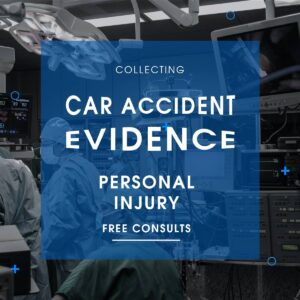Car Accident Evidence
The moments after a car accident are a very hectic experience. Gathering car accident evidence for your personal injury matter is likely the last thing you're worried about. There may be injuries, there is likely serious damage, and your adrenaline is flowing. It can be difficult to know exactly what to do to preserve your injury case.
The most important thing is to make sure you are OK. If you are severely injured get medical help. It is not worth risking further injury to immediately collect car accident evidence. If you are able to, however, these car accident evidence tips can help give you the best chance possible at recovering damages.
What is car accident evidence?
Car accident evidence is any information or physical object that can be used to prove what happened in a car accident and who was at fault. This evidence can be used to support a claim for compensation from an insurance company or to prove fault in a court of law.
There are many different types of car accident evidence, including:
- Scene evidence: This includes physical evidence at the scene of the accident, such as skid marks, debris, and damage to the vehicles involved. Scene evidence can be used to reconstruct the accident and determine how it happened.
- Witness statements: Statements from eyewitnesses to the accident can be very helpful in determining what happened. Eyewitnesses can provide information about the positions of the vehicles before and after the accident, the speed of the vehicles, and the actions of the drivers.
- Vehicle condition: The condition of the vehicles involved in the accident can also provide clues about what happened. For example, damage to the front of a vehicle may indicate that it was hit head-on, while damage to the rear of a vehicle may indicate that it was rear-ended.
- Driver impairment: If either driver was impaired by alcohol or drugs, this can be important evidence in a car accident case. Evidence of driver impairment can include blood alcohol concentration (BAC) test results, field sobriety test results, and eyewitness statements about the driver's behavior.
- Police reports: Police reports typically include a summary of the accident, as well as the officer's observations and conclusions. Police reports can be important evidence in a car accident case, but it is important to note that they are not always accurate or complete.
If you have been involved in a car accident, it is important to collect as much evidence as possible. This evidence can help you to protect your legal rights and to obtain compensation for your losses.
Knowing what evidence exists helps, but what about collecting it? We got you covered, here are some tips for collecting car accident evidence:
- Take photos and videos of the scene of the accident and the damage to the vehicles involved.
- Get the contact information of any eyewitnesses.
- Be honest and cooperative with the police.
- Keep a copy of all police reports and other documentation related to the accident.
- Contact an experienced car accident attorney to discuss your legal rights and options. Once you've hired a personal injury attorney they will help you collect any available evidence.
Why is it important to collect car accident evidence?
It is important to collect car accident evidence for a number of reasons, including:
- To determine fault: Car accident evidence can be used to determine who was at fault for the accident. This is important for both insurance and legal purposes.
- To support a claim for compensation: If you have been injured in a car accident, you may be able to file a claim with your insurance company or the insurance company of the at-fault driver. Car accident evidence can help to support your claim and increase the chances of you receiving compensation for your losses.
- To protect your legal rights: If you are sued by the other driver or their insurance company, car accident evidence can help to defend you in court.
- To create a record of the accident: Car accident evidence can be used to create a record of the accident. This can be helpful for a number of reasons, such as if you need to file a claim with your insurance company in the future or if you need to provide documentation of the accident to your employer or other organizations.
Even if you think you know who was at fault for the accident, it is still important to collect evidence. This is because insurance companies and lawyers may have different views on who was at fault. Insurance companies would love for their clients to never be at fault. That would save them a lot of money. Having evidence can help to support your case and increase the chances of you receiving fair compensation for your losses.
Car Accident Evidence Summary
Assuming you are not seriously injured, the first thing to do is move the cars to the side of the road. This gets you, the other drivers, and any passengers out of harm’s way.
The second thing to do is take pictures of your vehicle and the accident scene.
Next, try to get the information of any witnesses who may be present. Once these people leave the scene, it can be almost impossible to track them down. Get their name and contact information so statements can be taken later.
When the police arrive, don’t admit fault or begin arguing with the other driver. Remain calm and get the other driver’s contact and insurance information. Arguing or starting a fight will not help your case.
After this, contact a Portland Car Crash Attorney as soon as possible. A lawyer will begin collecting information and building your case. The sooner you collect evidence, the better your chances of winning your case.
To learn more about how a Portland Car Crash Attorney can help after your accident, contact Johnson Law right away for a free consultation.
We will review your case for free.
Pay us nothing unless we get you a better settlement.
We work on contingency.


